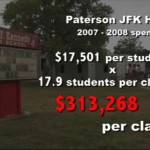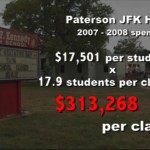The film The Cartel is a critical review of the questionable administrative practices in American education using New Jersey public and charter schools as a case study. Reporter Bob Bowdon discusses largely the ineffective tendency in American education to perpetually throw more and more money at a problem without any real progress or change. From an administrative standpoint, Bowdon points out the negative effects of tenure for teachers and how it makes removing ineffective or even dangerous teachers from the classroom. Throughout the movie, there are many interviews with the leader of the New Jersey Educational Association (NJEA), which is the major teachers union in New Jersey. The movie adopts the approach that the union is less concerned with the adequacy of the teachers and more just protecting their jobs, sometimes at the expense of the student. In addition to the harmful effects of the union, the documentary exposes the unfair practices associated with charter school application as well as the district avoidance of approving charters because of the goal of keeping money within the district. Bowdon also highlights the controversial voucher program however they receive so much opposition yet they tend to yield very good results in allowing children to go to schools they otherwise wouldn’t be able to go to. The movie is summed up in a simple statement made as one of the last lines of the movie, “this is a crime, it’s not terrorists that are going to destroy America, it’s urban public education” (The Cartel 1:30:30).
The overarching message of The Cartel is that education operates under a corrupt system. Bowdon points out a few major points as to why this is but clearly rests on the contrast between district public schools and sources of alternative schooling. Under this corrupt system, as much as billions of dollars can go missing and without any sort of accountability it seems that there is no change. The theme of corruption remains throughout the entire movie and doesn’t solely point to monetary examples. Examples such as the district officials denying charters without any official reason or for something as small as a minor typo in the application highlight Bowdon’s critique of the system. With corruption at the root of the issue, he shows how the political structure of the education system is more concerned with the bureaucracy of teaching and not the actual learning of students.
The greatest example of the corruption of schooling Bowdon points out in The Cartel is the level of spending per student in America without and results. Specifically Bowdon points the Paterson JFK High School. After asking people in the community how much they think is spent per class, the consensus is around $90,000. The people are shocked to find out that it is over $300,000(The Cartel 0:06:55). With this kind of spending within the classroom, one has to question why teachers still make around $55,000 a year. This is by far the most compelling evidence for corruption in the schools. It is absurd that as a nation we can spend that much and still be ranked 24th for world math scores as far as the PISA showed (The Cartel 0:02:34). Bowdon’s unique perspective as someone not operating within the educational system allows him to see these gross expenditures for what they really are: an exploitation of practices with no accountability.
(The Cartel 0:06:55)
Bowdon goes on to look at the School Construction Corporation, which is responsible for allowing a billion dollars to disappear. While other programs in the district would have budgets that they went over or needed to supplement, Mary Jane Cooper, the New Jersey Inspector General, points out that for the SCC, “there was no budget”(The Cartel 0:18:47). This kind of oversight to not set limits on large-scale district run programs is exactly what Bowdon is trying to highline throughout the movie
(The Cartel 0:18:57).
What Bowdon takes so much care to point out about the practices in New Jersey he then uses as a model of corruption to apply to the entire country. This is the area of the movie that seems to lack the same level of attention that he uses when looking at New Jersey alone. Amy Biancolli of the SF Gate writes that “From New Jersey, he extrapolates sweeping generalizations about school districts across the country” (Biancolli). While Bowdon’s documentary was received quite well as a message clearly conveying the crisis that our nation is experiencing, it does seem like the only crisis conveyed is the one found in New Jersey. There is definite merit to the question of whether of not this can really be applied to the national education system. While yes many of the points made are problems that are possible in every state that operates with school boards, but is it really a crisis found to this degree across the nation. Amy Biancolli shows how with huge generalizations, Bowdon loses elements of his credibility.
Works Cited:
Biancolli, Amy. “Review: ‘The Cartel’ Rates a failing Grade.” SF Gate. N.p., 30 Apr. 2010. Web. 21 Feb. 2013. <http://www.sfgate.com/movies/article/Review-The-Cartel-rates-a-failing-grade-3190988.php>.
The Cartel. Dir. Bob Bowdon. Bowdon Media, 2009. DVD.




